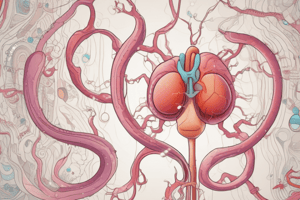Podcast
Questions and Answers
Which hormone secreted by the kidneys is primarily responsible for maintaining blood pressure?
Which hormone secreted by the kidneys is primarily responsible for maintaining blood pressure?
- Erythropoietin
- Renin (correct)
- Insulin
- Adrenaline
Erythropoietin is involved in the production of red blood cells.
Erythropoietin is involved in the production of red blood cells.
True (A)
What are the three stages involved in the process of producing urine?
What are the three stages involved in the process of producing urine?
glomerular filtration, selective reabsorption, tubular secretion
The kidneys help in the absorption of __________ and phosphorus in bones by producing an active form of vitamin D3.
The kidneys help in the absorption of __________ and phosphorus in bones by producing an active form of vitamin D3.
Match the following substances with their corresponding percentage in urine:
Match the following substances with their corresponding percentage in urine:
What is the primary process by which blood is filtered in the kidneys?
What is the primary process by which blood is filtered in the kidneys?
Glomerular filtration rate (GFR) decreases when hydrostatic pressure in the wall increases.
Glomerular filtration rate (GFR) decreases when hydrostatic pressure in the wall increases.
What percentage of water is reabsorbed in the Proximal Convoluted Tubule (PCT)?
What percentage of water is reabsorbed in the Proximal Convoluted Tubule (PCT)?
The primary product of the kidneys, formed through ultrafiltration, is called ______.
The primary product of the kidneys, formed through ultrafiltration, is called ______.
Which of the following substances is actively reabsorbed in the nephron?
Which of the following substances is actively reabsorbed in the nephron?
All nitrogenous wastes are reabsorbed back into the blood during filtration.
All nitrogenous wastes are reabsorbed back into the blood during filtration.
Match the following substances with their reabsorption locations in the nephron:
Match the following substances with their reabsorption locations in the nephron:
What hormone facilitates sodium reabsorption in the kidneys?
What hormone facilitates sodium reabsorption in the kidneys?
What is the main function of the nephron?
What is the main function of the nephron?
The distal tubule is responsible for reabsorbing glucose.
The distal tubule is responsible for reabsorbing glucose.
What process helps maintain the concentration gradient inside the kidney medulla?
What process helps maintain the concentration gradient inside the kidney medulla?
The loop of Henle is important for concentrating the __________.
The loop of Henle is important for concentrating the __________.
Match the parts of the nephron with their functions:
Match the parts of the nephron with their functions:
Which component is NOT typically found in urine?
Which component is NOT typically found in urine?
The collecting duct primarily secretes urea.
The collecting duct primarily secretes urea.
What two substances are reabsorbed in the proximal tubule?
What two substances are reabsorbed in the proximal tubule?
Which substance is primarily secreted into the filtrate during tubular secretion?
Which substance is primarily secreted into the filtrate during tubular secretion?
The ascending limb of the loop of Henle is permeable to water.
The ascending limb of the loop of Henle is permeable to water.
What role does aldosterone play in the counter current mechanism?
What role does aldosterone play in the counter current mechanism?
The process that adjusts the pH of urine is _____ secretion.
The process that adjusts the pH of urine is _____ secretion.
Match the following components with their functions:
Match the following components with their functions:
What is the primary effect of the counter current multiplier?
What is the primary effect of the counter current multiplier?
Counter current mechanisms occur only in the distal convoluted tubule.
Counter current mechanisms occur only in the distal convoluted tubule.
What is the main function of tubular secretion in the kidneys?
What is the main function of tubular secretion in the kidneys?
The ______ limb of the loop of Henle is permeable to water.
The ______ limb of the loop of Henle is permeable to water.
Which hormone is responsible for the reabsorption of water in the kidneys?
Which hormone is responsible for the reabsorption of water in the kidneys?
Flashcards are hidden until you start studying
Study Notes
Functions of the Kidney
- Homeostatic Regulation: Kidneys filter blood, excrete waste, and maintain fluid balance through urine.
- Endocrine Role: Secrete hormones like renin (regulates blood pressure) and erythropoietin (stimulates red blood cell production).
- Vitamin D Production: Synthesizes active vitamin D3, aiding in calcium and phosphorus absorption, essential for bone health.
- pH Balance: Adjusts blood pH by managing bicarbonate (HCO3-) and hydrogen ions (H+) in urine.
- Water Regulation: Produces dilute or concentrated urine based on environmental conditions.
- Urine Formation Process: Involves glomerular filtration, selective reabsorption, and tubular secretion.
Composition of Plasma and Urine
- Plasma vs. Urine: Significant differences with higher urea and uric acid in urine and virtually no glucose or proteins.
Glomerular Filtration
- Ultrafiltration: Initial blood filtration occurs in the glomerulus under hydrostatic pressure, producing glomerular filtrate.
- Components of Filtrate: Includes water, electrolytes, amino acids, bicarbonates, and nitrogenous wastes.
- Glomerular Filtration Rate (GFR): Proportional to hydrostatic pressure; kidneys filter approximately 180 liters of blood daily, producing about 2.5 liters of urine.
Selective Reabsorption
- Nephron Tubules: Alters the composition of filtrate as it flows through Proximal Convoluted Tubule (PCT), Loop of Henle, and Distal Convoluted Tubule (DCT).
- Reabsorption in PCT:
- Majority of nutrients, such as glucose (100%), amino acids, and water (67%).
- Active and passive mechanisms for Na+, K+, and water facilitated by hormones like aldosterone and ADH.
- Urine Composition Differences: Urea and uric acid levels are higher in urine compared to filtrate.
Tubular Secretion
- Waste Removal: Includes substances such as urea, creatinine, hydrogen ions, and potassium ions actively secreted from blood into filtrate, primarily occurring in PCT and DCT.
- pH Regulation: Helps adjust urine pH.
Counter Current Mechanism
- Ionic Exchange: Involves Loop of Henle; ascending limb reabsorbs ions (Na+, K+, Cl-) while being impermeable to water, creating a hypertonic medulla.
- Water Reabsorption: Facilitated by ADH and osmotic gradients enhanced by urea.
- Concentration Gradient: Maintains urine concentration and volume through opposing fluid flows in nephron and peritubular capillaries.
Urine Formation
- Nephron Function: Functional unit of kidney filtering blood and producing urine through renal corpuscle and renal tubule processes.
- Filtrate Composition: Contains water, sodium chloride, bicarbonate, urea, glucose, amino acids, and various drugs.
- Distal Tubule: Reabsorbs sodium chloride, secretes hydrogen ions, develops urine concentration.
Collecting Duct
- Final Adjustment: Reabsorbs water and sodium chloride, secretes urea before urine reaches renal pelvis.
Summary of Urine Characteristics
- Final urine composition highlights the efficiency of kidneys in filtering and reabsorbing critical substances, maintaining balance within the body.
Studying That Suits You
Use AI to generate personalized quizzes and flashcards to suit your learning preferences.




